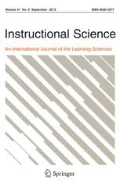Abstract
This article first addresses the development of information and problem-solving procedures as “objectified” knowledge and the continuously increasing amount of it. For education decisions must be made which part of it should be passed on to future generations as obligatory for all members of a community or only for those persons who will prepare themselves for a special position. Than a description of instructional design is provided and the recent criticisms are discussed. This leads to an outline of an integrative framework for the description of information and problem-solving procedures and to a problem-solving approach for the acquisition of knowledge and skills. Three categories of problems are distinguished, categorization or description problems, interpretation problems and design problems. The solution of the many problems result in different cognitive constructs. Once these are published and selected for education they form the content of the subjects. For the development or construction of knowledge and the practicing of skills the learners should be involved in problem-solving activities, such as exploration, imagination, discovery, application and design. The required results of learning may differ. Three levels of performance, illustrated within the categories of problems are distinguished. It is shown that the content of the subjects and levels of performance can guide the selection of instructional strategies and make it possible to classify the learning situations. Finally some implications for curriculum design and for the selection of problems to be solved by the students are discussed.
Similar content being viewed by others
References
Dijkstra, S., Krammer, H.P.M. & Van Merriënboer, J.J.G., eds. (1992). Instructional Models in Computer-Based Learning Environments. Heidelberg: Springer Verlag.
Gagné R.M. & Briggs, L.J. (1979). Principles of Instructional Design (2nd Edition). New York, NY: Holt, Rinehart & Winston.
Merrill, M.D. (1983). Component Display Theory, in C.M. Reigeluth, ed., Instructional Design Theories and Models (pp. 279–333). Hillsdale, NJ: Lawrence Erlbaum.
Paas, F.G.W.C. & VanMerriënboer, J.J.G. (1994). Variability of worked examples and transfer of geometrical problem-solving skills: A cognitive-load approach. Journal of Educational Psychology 86: 122–133.
Reigeluth, C.M., ed. (1983). Instructional Design Theories and Models. Hillsdale, NJ: Lawrence Erlbaum.
VanMerriënboer, J.J.G. (1990). Strategies for programming instruction in high school: Program completion vs. program generation. Journal of Educational Computing Research 6: 265–285.
VanMerriënboer, J.J.G. & De Croock, M.B.M. (1992). Strategies for computer-based programming instruction: Program completion vs. program generation. Journal of Educational Computing Research 8: 365–394.
Van Merriënboer, J.J.G. & Krammer, H.P.M. (1987). Instructional strategies and tactics for the design of introductory computer programming courses in high school. Instructional Science 16: 251–285.
Winn, W. (1993). A constructivist critique of the assumptions of instructional design, in T.M. Duffy, J. Lowyck & D.H. Jonassen, eds., Designing Environments for Constructive Learning (pp. 189–212). Berlin: Springer-Verlag.
Author information
Authors and Affiliations
Rights and permissions
About this article
Cite this article
DIJKSTRA, S. The integration of instructional systems design models and constructivistic design principles. Instructional Science 25, 1–13 (1997). https://doi.org/10.1023/A:1002902427253
Issue Date:
DOI: https://doi.org/10.1023/A:1002902427253




